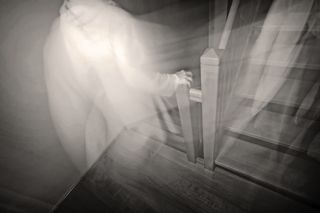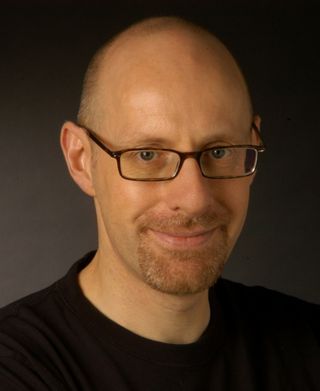What's Really Behind Paranormal Experiences (Hint: It's Not Ghosts)

Richard Wiseman doesn't believe in spooks — and he doesn't think you should, either. Once a professional magician, the University of Hertfordshire psychologist has always been intrigued by the unusual side of the human experience, conducting research on luck, lying and the paranormal.
In his new book, "Paranormality," (Macmillion, 2011), Wiseman delves into the science (or lack thereof) of hauntings, psychics, telepathy and other supposedly inexplicable phenomena.
Americans will have to seek out the book on Kindle, as American publishers told Wiseman there was no market for debunking the paranormal in the U.S. LiveScience begs to differ, so we got in touch with Wiseman to talk about the allure of the occult and why Americans are so fond of psychic hotlines.
LiveScience: Why are people so drawn to paranormal beliefs?
Wiseman: One is that they have paranormal experiences. In fact, that's the thrust of the book, to try to understand why people have those weird experiences given that spirits don't exist. There's also the notion that these believes are very comforting. So if you're ill, then the idea of the psychic healer is a nice idea. And then there's the influence of the paranormal industry. The books, the television shows, the psychic hotlines all have a vested interest in getting the public to believe this stuff. [Read Monsters, Ghosts & Gods: Why We Believe]

LiveScience: So you're not a believer?
Wiseman: No, I tend to be a tad skeptical. I've worked in the field for about 20 years and I've never seen anything that convinces me that any of this stuff is true. What I have seen is that people have weird experiences, whether with Ouija boards or ghosts or a psychic, that tell us about their brains, their behavior and their beliefs.
Sign up for the Live Science daily newsletter now
Get the world’s most fascinating discoveries delivered straight to your inbox.
LiveScience: What does the belief in the paranormal tell us about our own psychology?
Wiseman: I think each one tells us something a little bit different. If you take sleep paralysis, that notion of waking up completely immobile, seeing a figure at the foot of your bed and you're convince that this evil spirit or demonic force is holding you down, that actually tells you a lot about the psychology of sleep. When we sleep, we're paralyzed so we don't act out our dreams, and that dream experience can come over into waking along with that paralysis. [Read: Top 10 Spooky Sleep Disorders]
LiveScience: What, to you, is the most interesting or strange paranormal belief?
Wiseman: I suppose ghosts, or the notion that people see something out of the corner of their eye, particularly if they're in a "haunted" location. It's the power of suggestion, as well as fear. When we become afraid, blood flows from the fingertips from the major muscles of the body as you get ready to run or fight, and that can make you cold. You also become hyper-vigilant, so you start noticing footsteps or voices you wouldn’t have noticed before, and start assuming this is some sort of weird paranormal activity.
LiveScience: You've done some ghost-debunking investigations. What did you find?
Wiseman: These were investigations carried out at Hampton Court Palace, a royal palace south of London, and up in Edinburgh in Scotland, supposedly one of the most haunted places in the U.K. We took people into buildings and asked them what locations seemed haunted. They'd often chose the same locations. Part of the reasons what those locations were sometimes physically colder due to thermal patterns. Sometimes they had this weird sort of infrasound [low-frequency sound] which can be caused by the rumble of traffic or wind across an open window. And other times these spots just sort of look scary because they're dark and we have a brain that has evolved to keep us out of dark places for good reason.
LiveScience: Psychics are a big business, and I understand you've upset some of them by discussing the tricks of the trade in your book. In all of your work, you've found no evidence that psychics have special capabilities?
Wiseman: No, I found they're very good at fooling people —in that case they have very special capabilities, but in deception. Here, paranormal belief crosses over from being fun into something serious. People go to psychics because they have problems, whether personal or financial, but you're talking to somebody who, unlike a counselor who would give you to tools to solve the problems, they just give you advice. You become reliant on them. And there's no way to know if they're giving good advice. They're not trained counselors. There's no regulation in the industry. So you're putting your life into somebody else's hands.
LiveScience: How do psychics make people believe that they're legit?
Wiseman: There's the notion of these general statements which are true of everyone. Like, "you have a lot of unexpressed creativity." Everyone wants to believe that's true of them and not everybody else. Or sometimes there are double-headers like, "sometimes you enjoy being the center of the party and sometimes you like staying at home with a book." That's true of everybody and you're just going to ignore the side that doesn't apply to you. There's this notion of feedback where they'll say something like, "You're going to be travelling," and if they get no response they'll say that maybe it's a small weekend trip, but if you start nodding along, it must be a big trip.
With all of these things, you're doing the work for them. If anything, they should be paying you.
LiveScience: Your book is published in the U.K. and in other countries, but you couldn't find a willing publisher in the U.S. Is there a difference between the paranormal belief in U.S. vs. U.K.?
Wiseman: I don't know quite what causes it, I suspect it's cultural, but you're looking at around 40 to 50 percent of people having an alleged paranormal experience in the U.K. and Europe versus 70 to 80 percent in the U.S.
Something big is going on. I suspect that part of it is programming: Books, radio and television pushing the psychic agenda. Plus of course science literacy is higher in the U.K. versus in America, so maybe you have the psychic industry pushing the one side and the other side can't get their message out. Even though I've published lots of other books in America, this one wasn’t going to happen. There were no serious offers from the major publishers. That's why we put it out on Kindle.
LiveScience: So for those of us with runaway imaginations, do you have any hints on how to talk yourself out of freaking out when you're home alone and the house is creaking and you're sure there's something right behind you?
Wiseman: I think there are all sorts of things. Running away from the house screaming is always good.
No, I think that just knowing what's going on helps. The book encourages people to do Ouija Board sessions. It isn't about summoning the spirits, it's about the players' unconscious movement that push the glass. So you can cut out the letters and lay them out and ask the spirit to spell out your name. But the moment you put the letters face down and mix them up, the spirit will become dyslexic. In the same way, once you understand sleep paralysis, it's not as scary. By understanding these things, they become a lot less terrifying.
You can follow LiveScience senior writer Stephanie Pappas on Twitter @sipappas. Follow LiveScience for the latest in science news and discoveries on Twitter @livescience and on Facebook.

Stephanie Pappas is a contributing writer for Live Science, covering topics ranging from geoscience to archaeology to the human brain and behavior. She was previously a senior writer for Live Science but is now a freelancer based in Denver, Colorado, and regularly contributes to Scientific American and The Monitor, the monthly magazine of the American Psychological Association. Stephanie received a bachelor's degree in psychology from the University of South Carolina and a graduate certificate in science communication from the University of California, Santa Cruz.